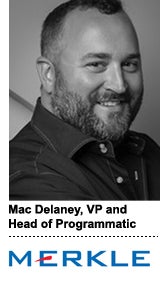 It might surprise those who think of Merkle as only a CRM agency to hear it has a media practice that employs 400.
It might surprise those who think of Merkle as only a CRM agency to hear it has a media practice that employs 400.
Although the division has taken four years to construct, Merkle has over the past several months recruited a handful of media agency heavyweights (including ex-Razorfish COO Michael Komasinski) to help support its expansion.
“Programmatic is one of the fastest-growing parts of Merkle’s business,” said Craig Dempster, EVP of the digital agency group at Merkle. “We have numerous Fortune 500 brands we execute media for and are investing heavily in both people and technology to accelerate this business.”
Merkle launched the audience platform MerkleOne late September and named three executives to its media services team last week. One of those execs is Mac Delaney, who served as SVP of programmatic for Starcom Mediavest (SMG) before becoming Merkle’s VP and head of programmatic.
Delaney spoke with AdExchanger about his transition and the changing face of the agency holding company.
AdExchanger: Why did you move to Merkle?
MAC DELANEY: The future agency model has DNA that doesn’t currently exist in today’s agency world. A big part of it is understanding audience segmentation, going all the way back to direct mail. I would extend that further and say, the future agency model is capable of handling your entire customer database.
I always tried to work [in disruptive areas] in my career: Federated Media/John Batelle was kind of the precursor to native. I was early in at Yahoo when we built the performance division. This move was a bet I saw other agency [executives] like Gerry Bavaro [who moved to Merkle from Omnicom’s Resolution Media] making.And the media component?
On top of database knowledge, you’d have an expertise in systems integration, and be able to consult with a marketer on how you understand audiences across different platforms and environments, and help them discover and learn more about their customers. You’d have key tactical components like social, SEO, email, display and programmatic, specifically. The last piece [is] where traditional agencies are holding on – you’d be able to buy tonnage of media based on relationships that you have, which help you negotiate.
Which is harder? The media or the systems integration part?
The hardest thing to do is to be the systems integrator. You look around the marketplace and see why agencies are encroaching on one another. The consultant firms have systems integration, but don’t have marketing or media buying experience per se, or database management to link it all together.
And then you have companies like Merkle. Although we’re in a category with Acxiom and Epsilon, we [can] activate audience segments and bring them into the marketing environment and optimize creative because of our acquisitions over the last 10 years.
Merkle’s history is as a CRM/database agency, but has moved aggressively into media and programmatic. Is this symptomatic of all the recent ad/mar tech mergers?
Our value prop is marrying old-school data management and marketing with new sources of data. And you see that through [Merkle’s] acquisitions and integrations.
In order to talk about addressable marketing beyond the cookie, you need to marry foundational data management with how things are activated in the cookie-based and post-cookie world. You have some holding companies saying, “Our CRM databases are now plugged into Facebook,” but beyond the press release, when a client asks how it works, you need agencies who speak that vernacular and Merkle is one of the companies doing that.
What do you make of all these agency holding companies investing in tech?
Owning technology is incredibly hard. If you’re Google, Yahoo, AOL, technically both media and bona fide tech [companies], it can be done. But ensuring that technology stack is on the bleeding edge compared to its competition is incredibly hard. So is integration. Every single company that’s made acquisitions to build a complete stack has that challenge. Google did in launching DBM (DoubleClick Bid Manager) and it took a good, long while to integrate Teracent and analytics and Invite Media. Adobe, the same.
The moment a company from outside that category, such as an agency, acquires technology, the clock starts ticking around how long will it take for that feature/capability/algorithm to be antiquated. The agency has to be very careful about what it buys versus what it builds or partners for. SMG buying a future-forward DMP and DSP [like RUN] – it has to be very surgical and make good, financial sense.
If you’re a client, you expect your agency to buy technology. I don’t know if that is a DSP for $500 million, but I do believe you need to understand the data management component. If you’re a client today and your agency hasn’t made an investment anywhere, you’d be wondering why and what’s taking so long.
Merkle was an early partner for Facebook’s and Google’s cross-device tools. How do you broach the issue of data ownership with clients?
Merkle is drawing a distinction between addressable and non-addressable marketing. When you leverage cookies, there will be an inherent imperfection. But given your ability to decide what percentage of your mix will be based on second- and third-party data, you could still make the “first” generation of addressable back out for you. This is where Merkle sees a lot of opportunity – linking the addressable, known customer database to, “We need to build audience segments based on ‘X’ five signals.”
Beginning now, with Google launching Customer Match, and Facebook with Atlas, those are giant, addressable one-to-one solutions, which will change the role of the agency. … [T]he complexities that arise from walled gardens underscore the need to have an unbiased, unconflicted partner in an agency who can help manage all of that. There is no smoke and mirrors when buying audiences in the digital world as there were five years ago.
The interview has been edited for clarity and length.












